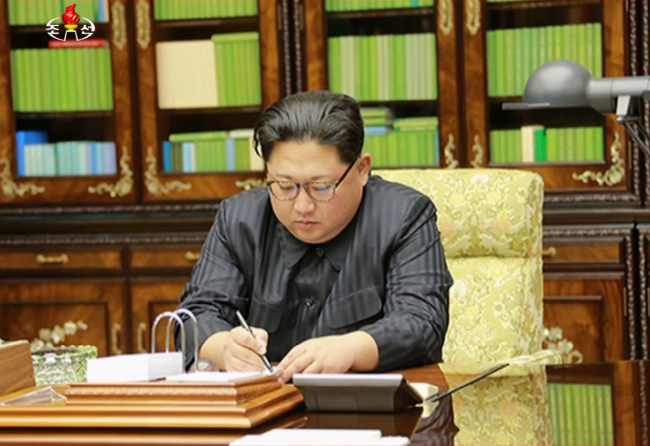North Korean leader Kim Jong-un declared his country had achieved its long-cherished goal of full-fledged nuclear statehood after successfully testing a new type of intercontinental ballistic missile on Wednesday.
The United States and its allies have always maintained they would never accept a nuclear North Korea, but have been forced to watch from the sidelines as Pyongyang pursued an accelerated weapons drive.
The United States and its allies have always maintained they would never accept a nuclear North Korea, but have been forced to watch from the sidelines as Pyongyang pursued an accelerated weapons drive.

But what did the latest test actually achieve and does the North‘s claim to have completed its nuclear deterrent open the door to diplomatic negotiations?
- A new missile? -
The North said Wednesday’s test was of a new ICBM -- called a Hwasong 15 -- that was capable of carrying a “super-large heavy warhead” to any target in the continental United States.
The North provided no images from the test for outside experts to analyse, but initial flight data suggested it was indeed a more powerful missile -- with some estimating a range of around 13,0000 kilometres (nearly 8,100 miles).
“Such a missile would have more than enough range to reach Washington DC, and in fact any part of the continental United States,” said US-based arms control expert David Wright.
Some questions will likely remain over the North‘s mastery of the technology required to guarantee any warhead would survive atmospheric re-entry -- the key element it has not yet demonstrated.
- A new nuclear state? -
Much is already being made of leader Kim Jong-Un’s declaration after the test that the North had finally realised “the great historic cause of completing the state nuclear force.”
Whether that means no more nuclear or missile tests in the future remains to be seen, but the clear suggestion is that Pyongyang now believes it has a nuclear arsenal that amounts to a credible, working deterrent.
“To me, ‘completing’ sounds pretty robust, not just about quality, but quantity,” said Melissa Hanham, senior research associate with the East Asia Nonproliferation Program of the Middlebury Institute.
It is likely that the US and its allies will continue to refuse to recognise North Korea as a nuclear state, but US Defence Secretary James Mattis conceded that Wednesday‘s test was a step towards ballistic missiles that can “threaten everywhere in the world, basically.”
The North’s end goal has always been a nuclear strike threat against the United States and it often refers to its nuclear weapons as a “treasured sword” to protect itself from potential invasion by its US “imperialist enemy.” (AFP)
-
Articles by AFP




![[Herald Interview] 'Amid aging population, Korea to invite more young professionals from overseas'](http://res.heraldm.com/phpwas/restmb_idxmake.php?idx=644&simg=/content/image/2024/04/24/20240424050844_0.jpg&u=20240424200058)












![[KH Explains] Korean shipbuilding stocks rally: Real growth or bubble?](http://res.heraldm.com/phpwas/restmb_idxmake.php?idx=652&simg=/content/image/2024/04/25/20240425050656_0.jpg&u=)

